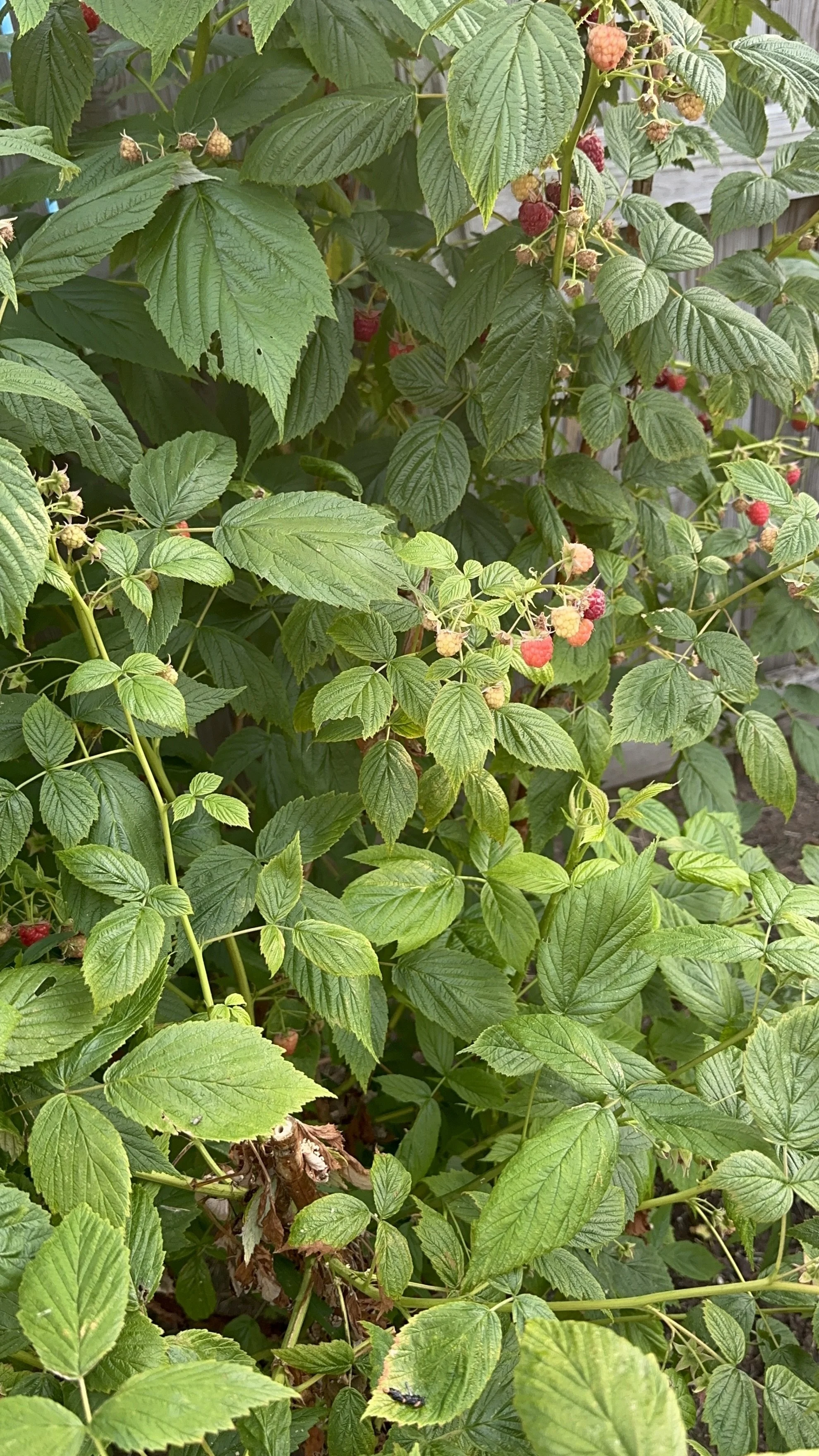Leadership Lessons from the Garden: 4 Ways to Harvest Your Juiciest Wins at Work
(Where the best leadership lessons come from, of course.)
Sometimes the best leadership lessons come from places you wouldn’t guess - like, a raspberry patch! Mine, to be exact.
This patch has shrubs as old as ten years. She is thicc!
I was in my garden recently. I hadn’t worked in it for weeks. You know how it is:
endless Slack notifications,
back-to-back Zooms,
and that perpetual feeling that if you step away from your laptop for five minutes, Everything. Will. Implode.)
But two weeks ago, the juiciest raspberries finally caught my eye. I walked outside in the early morning, damp summer air - barefoot, of course (because I’m an absolute monster on my pedicures) and I turned my focus to just...being…present.
No social media.
No inner dialogue about what needs to get done in the next 15 minutes.
Just the now. The present. With those dazzling little ruby gems of nature.
What I discovered as I plucked each ripe berry, though, surprised even me: some deeply important leadership lessons that I share with you now.
Turns out, when you stop trying so hard to optimize everything, life has a funny way of teaching you what actually matters.
Leadership Lesson #1: Your "Old Guard" Employees Are Probably Your Secret Weapon
My oldest raspberry plants (some are 10 years old) look, well, tired. They’re shorter than the new ones, with sparser, woody stems covered in razor-sharp thorns. Definitely not as Instagram-worthy as the newer shoots - which stand 8 feet tall with shiny, green stems.
Then I started counting berries……
The older plants? Absolutely loaded with fruit. Smaller berries, sure, but —wow—so many of them. And sweeter than sweet.
The younger ones? The berries were still sweet - but there were far fewer of them. They were larger, yes, but I had to search harder to find them.
Sound familiar? We live in a culture obsessed with fresh talent, the latest hire, the disruptor who's going to revolutionize everything. Meanwhile, that quiet team member who's been with you for five years—the one who doesn't volunteer for every project or suggest we "pivot the paradigm"—could likely be carrying half your department.
Research backs this up: teams with experienced members consistently outperform all-newbie squads by 23%. Your veteran employees aren't deadweight. They're your berries-per-square-inch champions.
Stop overlooking the steady performers for the shiny new toys. Better yet, mingle them well. My garden boasts heritage plants with new shoots every summer–and our crop is incredible!
Ready to harvest leadership lessons like this every week?
There’s a 788% return on investment that executive coaching produces (that’s not a typo, by the way.)
Leadership Lesson #2: Mentoring Feels Inefficient Because It Is (And That's the Point)
Enter on the raspberry-picking-scene: my six-year-old "assistant” (aka - my kiddo), who insisted on helping pick berries. If you've ever tried to accomplish literally anything with a kindergartener, you know how this went: dropped berries, trampled plants, and enough questions to power a small law firm.
My Type-A brain was screaming, “This is taking forever. Let me just pick these and move on!”
Yes, we could have been done in half the time without the "help." But watching her face when she finally mastered the gentle twist motion needed to pick a berry without squashing it?
Pure magic.
She was learning something I couldn't teach through explanation—and building confidence I couldn't hand her.
Here's the uncomfortable truth: good mentoring is wildly inefficient in the short term. MIT research shows experiential learning takes 60% longer initially but creates three times stronger knowledge retention.
Those messy conversations with junior team members, the projects that take twice as long because you're teaching instead of doing—that's not lost productivity. That's legacy-building.
Be patient. Ignore the KPI’s for a moment. Our impatience with "inefficient" mentoring or teaching processes might be the biggest threat to our teams’ futures.
Leadership Lesson #3: You Cannot (And Should Not) Pick Everything NOW (or ever)
Standing there with a full basket of berries, I stared at the about 200 unpicked berries still hanging on branches and felt…prickly. I wanted to gather all the berries. I wanted to speed things up. Some berries were perfect but I just couldn’t reach them without injury or extreme measures. Others needed another week to ripen. But my impatience or desire weren’t going to change the situation or the berries’ biology.
What’s more: not every berry needed to be picked by me right then. The ones I couldn't get to? If I couldn’t get to them tomorrow, they'd fall, decompose, and create seeds for next year's harvest.
See - nature doesn't stress about completion rates, and we could learn something from that.
Leaders? Oh, we’re obsessed with crossing every item off every list.
But, Google's research on high-performing teams confirms what my berries were demonstrating: the best results come from understanding natural development cycles, not rushing artificial deadlines. Your team member who needs more time to process feedback isn't slow—they might be thorough. Your project that's taking longer than expected might be developing into something better than you originally envisioned.
Sometimes the most strategic thing we can do is let something go unpicked; give it time to grow and evolve. Sure, do what you can to move things along, when you can, in your best way possible. But remember: letting go isn’t giving up—it's smart resource allocation.
Sometimes the sweetest results come from leaders brave enough to wait for the right moment instead of forcing the convenient one.
Lesson #4: The "Inconveniences" Are Actually Features
Here's what I initially saw as “problems”:
bees buzzing around (annoying),
dirt under my feet (messy),
thorns catching my fingertips (painful),
and my little helper making mistakes (inefficient).
Then I remembered: bees are pollinators, dirt has nutrients, thorns are protection, and mistakes are education. Every "inconvenience" was actually an essential part of the ecosystem.
Teams with psychological safety—including room for mistakes, discomfort, and natural friction—outperform sanitized environments by 47%. The mess isn't a bug in your leadership system. It's a feature.
Stop trying to eliminate every source of resistance. Some of it is keeping your team growing.
The Real Leadership Lesson: Sometimes You Need to Get Your Hands Dirty
The biggest insight wasn't about berries at all—it was about presence. In those 10 minutes away from my phone, with dirt under my nails and morning sun on my face, I experienced a kind of clarity that a productivity hack like “sprints” has never delivered.
We're so busy optimizing our leadership that we forget to actually lead ourselves.
So busy managing our teams that we forget to connect with them.
So busy harvesting results that we forget to tend the garden.
The raspberry patch reminded me that sometimes the most profound leadership moments happen when you stop trying to be productive and start being present. When you slow down enough to notice what's actually growing around you.
Your Next Move
I'm not suggesting you abandon your calendar and take up farming (though honestly, it's tempting). But maybe—just maybe—there's something in your leadership practice that needs less optimization and more attention.
Maybe it's spending unstructured time with your team.
Maybe it's letting a project take the time it actually needs instead of the time you think it should take.
Maybe it's getting comfortable with the fact that good leadership sometimes looks messy, inefficient, and imperfect.
The berries are still there, by the way. Every morning I see them through my kitchen window, quietly doing their thing without my constant management.
Turns out they're pretty good teachers.
And we celebrated the harvest, too! (Hint: bonus leadership lesson there.) My family savored every bite and used those berries in every way we could. What a sweet and satisfying experience.
Want more unconventional leadership insights delivered to your inbox? Subscribe to our monthly newsletter and join thousands of leaders learning to lead differently.




